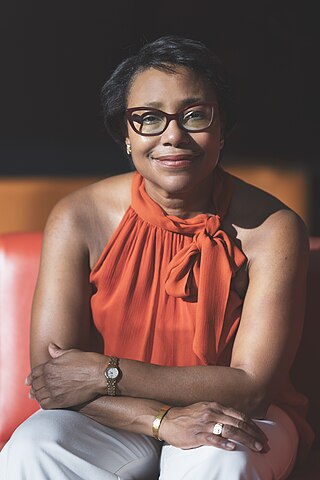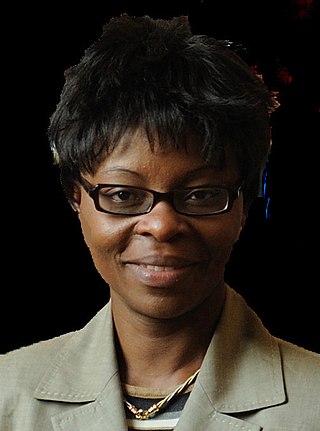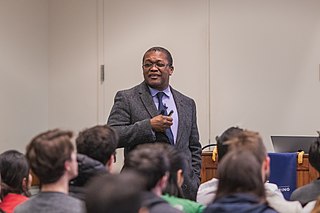Jean M.J. Fréchet is a French-American chemist and professor emeritus at the University of California, Berkeley. He is best known for his work on polymers including polymer-supported chemistry, chemically amplified photoresists, dendrimers, macroporous separation media, and polymers for therapeutics. Ranked among the top 10 chemists in 2021, he has authored nearly 900 scientific paper and 200 patents including 96 US patents. His research areas include organic synthesis and polymer chemistry applied to nanoscience and nanotechnology with emphasis on the design, fundamental understanding, synthesis, and applications of functional macromolecules.
Craig Jon Hawker is an Australian-born chemist. His research has focused on the interface between organic and polymer chemistry, with emphasis on the design, synthesis, and application of well-defined macromolecular structures in biotechnology, microelectronics, and surface science. Hawker holds more than 45 U.S. patents, and he has co-authored over 300 papers in the areas of nanotechnology, materials science, and chemistry. He was listed as one of the top 100 most cited chemists worldwide over the decade 1992–2002, and again in 2000–2010.

Chad Alexander Mirkin is an American chemist. He is the George B. Rathmann professor of chemistry, professor of medicine, professor of materials science and engineering, professor of biomedical engineering, and professor of chemical and biological engineering, and director of the International Institute for Nanotechnology and Center for Nanofabrication and Molecular Self-Assembly at Northwestern University.

Anthony "Tony" Guiseppi-Elie is a Trinidad-born, American scientist, engineer, entrepreneur, and avid Wikipedia editor. He is the President and Sr. Fellow of the American International Institute of Medical Sciences, Engineering and Innovation and the President and Scientific director of ABTECH Scientific, Inc. He is noted for his research and commercial development of biologically inspired and chemically responsive electroconductive hydrogels. Guiseppi-Elie is the Founding Editor-in-Chief of the transdisciplinary journal Bioengineering.
David A. Tirrell is an American chemist and the Ross McCollum-William H. Corcoran Professor and professor of chemistry and chemical engineering at the California Institute of Technology (Caltech). A pioneer in the areas of polymer synthesis and protein biosynthesis, his research has a wide range of applications, including coatings, adhesion, lubrication, bioengineering and biomedical intervention. From 2012 to 2018, Tirrell was the director of the Beckman Institute at Caltech. As of 2017, he serves as Caltech's Provost. He is one of very few American scientists to have been elected to all three branches of the United States National Academies: the National Academy of Sciences (2006), the National Academy of Engineering (2008), and the Institute of Medicine (2011). He was elected a Member of the American Philosophical Society in 2019.
Buddy Ratner is an American professor of chemical engineering and bioengineering. He is the director of the Research Center for Biomaterials at the University of Washington. He is also the faculty member for the Program for Technology Commercialization at the University of Washington.

Zhenan Bao is a Chinese-born American chemical engineer. She serves as K. K. Lee Professor of Chemical Engineering at Stanford University, with courtesy appointments in Chemistry and Material Science and Engineering. She served as the Department Chair of Chemical Engineering from 2018 to 2022. Bao is known for her work on organic field-effect transistors and organic semiconductors, for applications including flexible electronics and electronic skin.

Paula Therese Hammond is an Institute Professor and the Vice Provost for Faculty at the Massachusetts Institute of Technology (MIT). She was the first woman and person of color appointed as head of the Chemical Engineering department. Her laboratory designs polymers and nanoparticles for drug delivery and energy-related applications including batteries and fuel cells.
Karen L. Wooley is an American polymer chemist. She is a Distinguished Professor at Texas A&M University whose research focuses on developing novel polymers and nanostructured materials. Previously, she was the James S. McDonnell Distinguished University Professor in Arts & Sciences at Washington University in St. Louis.

Omowunmi "Wunmi" A. Sadik is a Nigerian professor, chemist, and inventor working at New Jersey Institute of Technology. She has developed microelectrode biosensors for detection of drugs and explosives and is working on the development of technologies for recycling metal ions from waste, for use in environmental and industrial applications. In 2012, Sadik co-founded the non-profit Sustainable Nanotechnology Organization.

Eugenia Eduardovna Kumacheva is a University Professor and Distinguished Professor of Chemistry at the University of Toronto. Her research interests span across the fields of fundamental and applied polymers science, nanotechnology, microfluidics, and interface chemistry. She was awarded the L'Oréal-UNESCO Awards for Women in Science in 2008 "for the design and development of new materials with many applications including targeted drug delivery for cancer treatments and materials for high density optical data storage". In 2011, she published a book on the Microfluidic Reactors for Polymer Particles co-authored with Piotr Garstecki. She is Canadian Research Chair in Advanced Polymer Materials. She is Fellow of the Royal Society (FRS) and a Fellow of the Royal Society of Canada (FRSC).
Ali Javey is a professor of electrical engineering and computer sciences at the University of California, Berkeley, a senior faculty scientist at the Lawrence Berkeley National Laboratory, and co-director of the Bay Area Photovoltaic Consortium and the Berkeley Sensor and Actuator Center. His research is focused on materials and device innovation for technological applications, particularly photovoltaics, wearable sensors, nanoelectronics, and programmable materials.
Anna Christina Balazs is an American materials scientist and engineer. She currently is Distinguished Professor at the University of Pittsburgh and holds the John A. Swanson Chair at the Swanson School of Engineering.
Christopher Ward Macosko (1944) is an American chemical engineer and professor emeritus in the department of chemical engineering and materials science at the University of Minnesota. He is internationally known for his work in polymer science and engineering, especially in the areas of rheology and polymer processing. Macosko is an author of more than 500 academic papers, dozens of patents, and two books including the text: "Rheology: Principles, Measurements and Applications". He served as director of the Industrial Partnership for Research in Interfacial and Materials Engineering (IPRIME), a university-industry consortium at the University of Minnesota, from 1999 to 2018. Macosko and his wife Kathleen have been married since 1967 and are long-time residents of Minneapolis. They have four children and 12 grandchildren.
Alan Kin-tak Lau is an engineer and academic based in Hong Kong SAR. He is the president and chair professor of product innovation at Technological and Higher Education Institute (Thei) of Hong Kong. Prior to this appointment, he was pro vice-chancellor at Swinburne University of Technology. He is also the Independent non-executive director of King’s Flair International (Holdings) Limited, the international vice president and trustee board member of The Institution of Mechanical Engineers (2014-2019) and an academic advisor at Asia University. He was also appointed the chair of professional accreditation panel for APEC/IPEA for Korea. From 2014 to 2016, he was the Alex Wong/Gigi Wong Endowed Professor in Product Engineering Design at the Hong Kong Polytechnic University (HPKU). Currently, he is a Fellow of European Academy of Sciences and Arts, the European Academy of Sciences. Lau has conducted research in the field of mechanical engineering, aerospace engineering and materials engineering. His work has been focused on aerospace composites, unmanned aerial vehicle, product design and engineering and bio-composites. Lau is recognized as Australian National Research Leader in Composite Materials 2019, published by The Australian Post. Within the period 2020-2022, he was director of Oceania Cybersecurity Centre Limited and Stawell Underground Physics Laboratory Company.
Hai-Quan Mao is a Chinese chemist and nanotechnologist. He is a professor at Johns Hopkins University and associate director of the university's Institute for NanoBioTechnology. He is a fellow of the Royal Society of Chemistry and the American Institute for Medical and Biological Engineering and a member of the National Academy of Inventors.

Lynden A. Archer is a chemical engineer, Joseph Silbert Dean of Engineering, David Croll Director of the Energy Systems Institute, and professor of chemical engineering at Cornell University. He became a fellow of the American Physical Society in 2007 and was elected into the National Academy of Engineering in 2018. Archer's research covers polymer and hybrid materials and finds applications in energy storage technologies. His h-index is 92 by Google Scholar.

Thomas H. Epps, III is an American chemist and the Thomas & Kipp Gutshall Professor of Chemical & Biomolecular Engineering at the University of Delaware. He has a joint appointment in Materials Science & Engineering, and an affiliated appointment in Biomedical Engineering. He serves as the director of the Center for Research in Soft Matter & Polymers, the director of the Center for Hybrid, Active, and Responsive Materials, and the co-director of the Center for Plastics Innovations. His research considers the design, synthesis, characterization, and application of nanostructure-containing polymers related to biobased materials, drug delivery, alternative energy (batteries), nanotemplating, and composite-based personal-protective equipment. He is also the co-founder of Lignolix, which is focused on the valorization of biomass waste.
Christopher William Bielawski is a distinguished professor at Ulsan National Institute of Science and Technology and group leader of the Synthesis Group in the Center for Multidimensional Carbon Materials. His research in synthesis and polymer chemistry has resulted in more than 290 publications and multiple patents.








